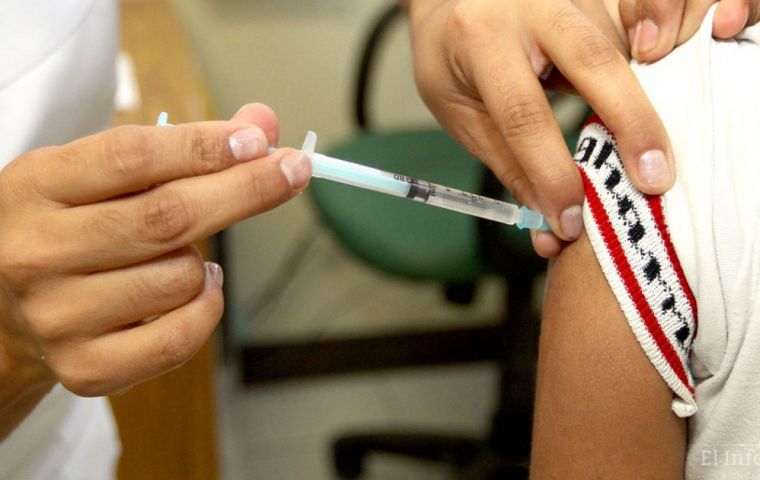MercoPress. South Atlantic News Agency
Brazil: Six state capitals begin vaccinating children against dengue
 Cases of dengue are mounting nationwide
Cases of dengue are mounting nationwide Health authorities in Brazil started Friday vaccinating children against dengue in six out the the ten State capitals chosen to start the South American Country's immunization program for which 712,000 doses were made available. The distribution of dengue vaccines to 315 municipalities began on February 8.
According to a survey by Agência Brasil, vaccination has begun in the Federal District and Goiás, two of the regions with the highest contamination rates, as well as in the capitals Campo Grande (MS), Salvador (BA), São Luís (MA) and Rio Branco (AC). In Natal (RN) and João Pessoa (PB), vaccination is expected to start next Monday. The states of São Paulo and Amazonas have yet to start immunization.
The Health has selected ten states to start immunizing children aged 10 to 11. The first batch will include 315 municipalities that meet the criteria defined by the Ministry in conjunction with the National Council of Health Secretaries (Conass) and the National Council of Municipal Health Secretaries (Conasems). This shipment covers 60% of the 521 municipalities selected. The remaining cities are expected to receive their doses by the first half of March.
Rio de Janeiro also started applying the dengue vaccine for adults aged 18 to 40 on Friday at the initiative of the city government, with the Health Ministry and the Oswaldo Cruz Foundation (Fiocruz). The campaign targets 20,000 adults in a study that will be voluntary. The vaccine will be administered in two doses with a 90-day interval between them, totaling 40,000 applications. Anyone who has already had dengue is not prevented from taking part in the research.
For two years, the researchers will collect information on cases, hospitalizations, and deaths to observe the difference in the virus's behavior between vaccinated and unvaccinated people. From there, the effectiveness of the vaccine in the adult population will be assessed and future national incorporation will be considered. The drug to be used is Qdenga, manufactured by the Japanese laboratory Takeda and recently incorporated by the Ministry of Health into the National Immunization Program (PNI). Qdenga offers protection against the four existing dengue virus subtypes: DENV1, DENV2, DENV3, and DENV4.
Rio de Janeiro has been in an emergency since Feb 5 with four deaths so far this year. This week, the State Health Department (SES-RJ) released data from the Monitora Panel for the period between January and February 13. There are 39,311 probable cases of dengue. In the whole of last year, the Health Intelligence Center (CIS-RJ) of the department recorded 51,479 probable cases of the disease, with 32 deaths.
Meanwhile, the Federal District government warns that severe cases of the disease can lead to conditions such as hepatitis and even kidney failure. According to the Federal District's Health Department, the seriousness of dengue fever stems from the inflammation caused in the organs and the way the virus acts in the body. “The virus enters the bloodstream, multiplies in various organs, and harmful substances are formed in the human body,” explained the secretariat in a statement.
“After the bite, the virus multiplies in organs such as the spleen, liver, and lymphatic tissue for four to seven days - a period known as incubation. The next phase - viremia - lasts around six days and is marked by fever. In this phase, the virus continues to multiply and the most common symptoms appear,” the document went on.
The dengue virus, according to the department, causes a change in the permeability of blood vessels, causing the loss of fluid called plasma, which should be inside the vessels and ends up going into cavities such as the abdomen and chest and subcutaneous tissue. As a result, the patient becomes dehydrated.
(Source: Agencia Brasil)




Top Comments
Disclaimer & comment rulesCommenting for this story is now closed.
If you have a Facebook account, become a fan and comment on our Facebook Page!